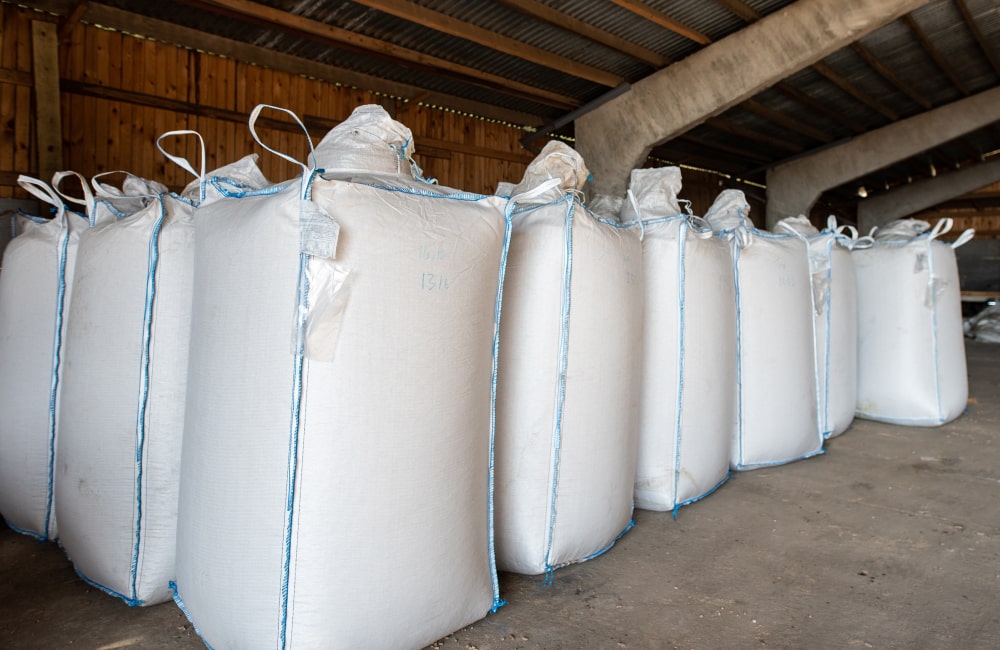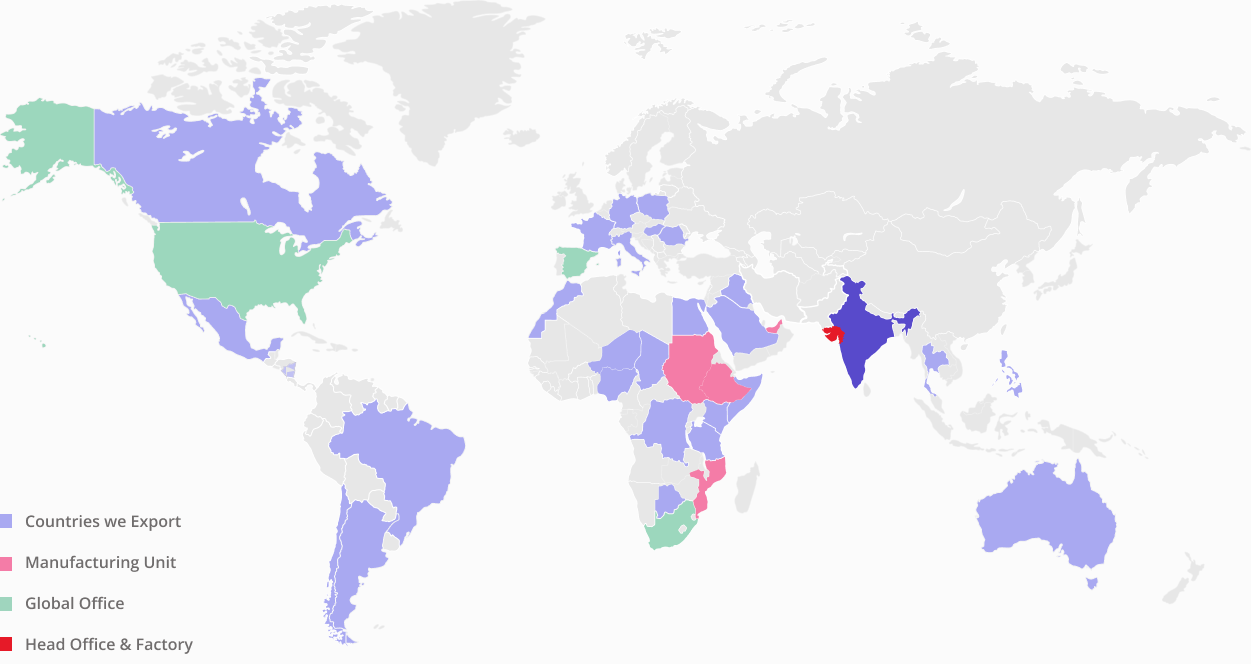FIBC Bags: The Versatile Solution for Bulk Material Handling

Let’s talk about Flexible Intermediate Bulk Containers, or as most of us know them, FIBC bags. These tough, versatile bags are like the workhorses of the packaging world, used in all sorts of industries. Made primarily from woven polypropylene, they’re perfect for storing and moving large quantities of dry materials. From agriculture to pharmaceuticals, FIBCs have a special place in many sectors. So, let’s dive into the different types of FIBC bags, what they’re used for, and the many perks they offer.
Different Types of FIBC Bags
FIBC Bags come in a variety of designs, and each type is made to fit specific needs. Choosing the right one depends on factors like how much the product weighs, how it will be handled, and what storage conditions are like.
Four-loop FIBCs are super popular. If you’re transporting heavy loads like grains or powders, these are your go-to bags.
Additionally, FIBCs can be classified based on their loop configuration: single-loop or double-loop. With fewer lifting points, they make handling even simpler. These bags are great for agricultural and construction tasks, perfect for carrying sand, cement, and fertilizers.
Then there are U-panel and circular FIBCs. U-panel bags are stitched from three pieces of fabric, giving them extra strength, while circular bags are woven in a seamless, cylindrical shape, which helps prevent spills and keeps their shape when filled.
If you’re storing fresh produce like potatoes or onions, you’d want to look at ventilated FIBCs. They’re designed to allow airflow, which helps keep those perishable goods fresh and prevents spoilage.
Now, baffle bags, or Q-bags, have internal baffles that help them hold a square shape when filled. This design makes them perfect for maximizing storage space and improving stability during transport.
For industries dealing with sensitive or flammable materials, conductive and anti-static FIBCs are a must. These bags prevent static electricity from building up, ensuring safe handling of chemicals and pharmaceuticals.
And if you’re transporting hazardous materials, you’ll want UN-certified FIBCs. These bags meet strict United Nations safety standards and undergo thorough testing to ensure they’re safe for transporting dangerous goods.
Where FIBC Bags Are Used
So, where can you find these handy bags?
In the agriculture and food industry, they transport grains, seeds, flour, sugar, and animal feed. Ventilated bags help maintain the freshness of produce, while food-grade FIBCs follow strict hygiene standards for safe handling.
The chemical and pharmaceutical industries rely on them to move powdered chemicals, minerals, and resins. Conductive FIBCs are vital for preventing static buildup, making them suitable for flammable substances. You’ll also find specialized FIBCs for bulk transport of active pharmaceutical ingredients.
In construction and mining, FIBCs are used for transporting sand, cement, gravel, and aggregates. Their robust design and high load capacity make them perfect for moving raw materials, while mining companies use them for efficiently transporting minerals and ores.
FIBCs are key in waste management and environmental operations, too. They help manage waste, sludge, and hazardous materials. UN-certified FIBCs ensure compliance with international regulations, while recycling facilities effectively use them to collect recyclables.
Lastly, the petrochemical and resin industries benefit from FIBCs for moving resins, polymers, and plastic granules. Anti-static FIBCs are crucial in preventing static-related incidents.
Why Choose FIBC Bags?
FIBCs come with a whole bunch of benefits that make them an ideal choice for bulk handling. Let’s take a look:
Cost-effectiveness is a big one. Because they’re lightweight, FIBCs can help reduce transportation costs compared to other packaging options. Plus, they’re reusable, which means long-term savings and a more eco-friendly approach.
These bags are highly customizable as well. You can tailor them to specific dimensions and load capacities, ensuring you get the perfect fit for your needs. Their adaptability to various sectors is increased by features like liners, baffles, and anti-static coatings.
Another benefit is space optimization. Baffle bags and circular designs hold their shape, making stacking and storage efficient. When they’re not in use, they can be folded flat, taking up minimal storage space.
Handling and transport are made easy with FIBCs, thanks to their lifting loops that work with cranes, forklifts, or hoists. Many bags come with spouts or discharge ports, simplifying the filling and emptying process, which can save on labor costs.
Strength and durability are also key features of FIBCs. Some can carry up to 2,000 kg and are resistant to moisture, UV rays, and temperature fluctuations, making them reliable for outdoor storage and transport.
On top of that, FIBCs are environmentally friendly. They are recyclable, helping reduce waste and lessen environmental impact. Their reusability also supports eco-friendly practices by cutting down on single-use packaging.
Finally, FIBCs help businesses meet regulatory compliance in industries with strict safety and hygiene standards. UN-certified and food-grade bags follow strict regulations to guarantee the safe transportation and storage of hazardous materials and food items.
FIBC bags have truly transformed bulk handling practices across a multitude of industries, combining strength, adaptability, and cost-effectiveness. Their versatility makes them essential in agriculture, construction, chemicals, and much more. As businesses continue to seek sustainable and efficient packaging solutions, the demand for specialized FIBCs is likely to grow.
By Choosing Satyendra Packaging Limited you will find the right type of FIBC tailored to their specific product needs and industry regulations, companies can streamline operations and ensure safe transport. With benefits like reusability, environmental advantages, and adherence to regulatory standards, FIBCs are indeed a vital asset in today’s logistics and supply chain management.
Recent Blogs
- FIBC vs. Rigid Containers: Which One Delivers Better ROI for Bulk Transport?
- The Rise of Flexible Packaging: What Manufacturers and Startups Must Know
- What Is PP Multifilament Yarn? Benefits, Uses, and Industry Applications
- Polypropylene (PP): Uses, Benefits, and Applications in Packaging Industry
- Leno Bags: A Stronger Packaging Backbone for India’s Farm Produce Market
- The Ultimate Guide to Choosing the Geotextile Fabric for Your Project
- Top 6 Best Packaging Materials for Bulk Goods: Strong & Sustainable
- What is Flexible Packaging? The Smart Choice for FMCG Export & Supply
- Complete Guide to FIBC Bags – Types, Uses, and Benefits You Should Know
- BOPP Laminated Woven Bags Benefits | Satyendra Packaging
- Innovative BOPP Film | Satyendra Packaging Ltd Manufacturing
- BOPP Pinch Bottom Bags | Reliable Custom Packaging
- BOPP Laminated PP Woven Sacks | Durable Custom Packaging
- Leno Bags for Fresh Produce – Breathable & Durable Packs
- PP Woven Fabric: Meaning, Properties & Applications Guide
- FIBC Jumbo Bags: Uses, Benefits & More | Satyendra Packaging
- Top 5 Benefits of Woven Geotextile Fabrics in Roads
- High-Quality BOPP Film Packaging | Satyendra Packaging India
- Are BOPP Films Safe for Food Packaging? | Satyendra Group
- Are FIBCs Recyclable? A Guide to Sustainable Bulk Bags
- BOPP/PP Block Bottom Bags: Types, Benefits & Industry Uses
- Why PP Multifilament Yarn is Essential for Multiple Industries
- Boost Your Business with BOPP Bags
- Knitted Geotextiles: Game-Changer in Civil Engineering Solutions
- How Flexible Packaging Solutions Help to Grow Business
- Types of Flexible Packaging and Their Advantages
- Reasons Why PP Leno Mesh Bags Are the Best Choice for Produce Packaging
- Why BOPP Laminated PP Woven Bags Are Right For Your Business?
- Woven Polypropylene Bags: The Complete Guide
- Exploring the Benefits of FIBC Bulk Bags: A Practical Guide

